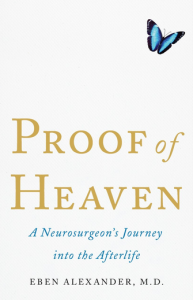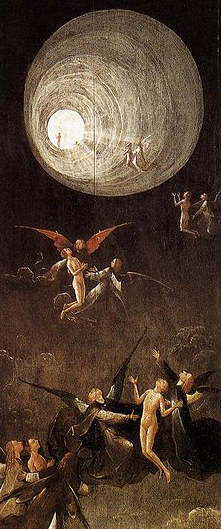 I was writing the last installment about The Moon tarot card when the library notified me that I had materials on hold. Really? I couldn’t remember putting anything on hold. I opened the e-mail. The book was Proof of Heaven, a Neurosurgeon’s Journey into the Afterlife. Ah, yes. I’d placed that hold over 4 months ago. There had been 32 people ahead of me. This is the longest I’ve ever had to wait for a book; stunning testimony to the fact that there are a ton of people out there looking for, well, Proof of Heaven.
I was writing the last installment about The Moon tarot card when the library notified me that I had materials on hold. Really? I couldn’t remember putting anything on hold. I opened the e-mail. The book was Proof of Heaven, a Neurosurgeon’s Journey into the Afterlife. Ah, yes. I’d placed that hold over 4 months ago. There had been 32 people ahead of me. This is the longest I’ve ever had to wait for a book; stunning testimony to the fact that there are a ton of people out there looking for, well, Proof of Heaven.
Heaven is, by all accounts, a higher dimension. Which is, as you will recall from the previous posts, the realm of The Moon, the territory so carefully guarded by The High Priestess.
There are literally thousands of accounts of near death experiences out there, and almost everyone knows someone who has had one. So what makes this one so special?

Dr. Eben Alexander contracted spinal meningitis caused by the gram negative bacterium E. coli. This is a fairly ubiquitous strain, commonly found in the human intestinal tract, which makes it very ubiquitous indeed. However, it is next to impossible for the bug to get into the cerebral spinal fluid and cause meningitis, especially in adults. This type of meningitis is usually lethal, and if it doesn’t kill you, it turns you into a vegetable. Not only did Alexander somehow manage to contract bacterial spinal meningitis, but he survived to tell the story and continue doing neurosurgery. A double miracle and a case for the medical journals. But the fact that he had a classic NDE during his 7 days in a coma was, as far as medical science is concerned, an even greater miracle.
Most NDEs occur when the heart stops beating, but the brain is still healthy. This is why the vast majority of

doctors discount NDEs as hallucinations caused by decreased oxygen and nutrients to the brain or by the exotic pharmacopoeia of drugs released by the brain in times of stress and deficiency. But you need a functioning brain to have a hallucination, and Alexander’s brain wasn’t functioning. His disease killed the neocortex, the part of the brain that we use to think and sense things, the part that makes us human. In other words he was brain dead, unable to think, imagine, feel, or visualize.
So if his brain wasn’t thinking, imagining, feeling, and visualizing the beautifully detailed and emotional journey he experienced, what was? Any mystic will tell you that it was his soul or spirit, the essential, non-physical part of us, that made the journey behind the High Priestess’s veil. This is the only explanation our culture provides, and this is Eben Alexander’s Proof of Heaven.
His case isn’t unique, however.
In the 1990’s Dr. Michael Sabom documents a very unusual brain surgery on Pam Reynolds. The operation required that both her heart and brain be stilled. In other words, she was clinically dead, both her EKG and EEG were flatlined. And yet, like Eben Alexander, she had an intense, emotional NDE. Her experience in the operating room was meticulously documented.
So why all the hoo-haw over this book? Dr. Sabom is a cardiologist and world renown NDE researcher. Light and Death, the book that describes Pam Reynolds experience, was published in 1998 and has, as of today, has a 4 star rating and 17 reviews on Amazon. Dr. Alexander’s book was published in 1912 and has a 4.5 star rating and 3,437 reviews on Amazon.
It may be because of the title. Proof of Heaven is a very arresting but false claim—he has no more proof than Dr. Sabom. And then there is the obvious observation that his and all other NDEs are anecdotal and have no witnesses except dead people—they are impossible to prove.
But I suspect that the real reason the book is so popular is that it’s an up close, first person tale of the religious conversion of a scientist, the quintessential non-believer. Dr. Alexander was convinced, like the vast majority of his colleagues, that the body generates the conscious mind. He listened to his patient’s stories of their near death experiences with the smug certainty that they were meaningless hallucinations. An NDE could only be the wishful thinking of a moribund body. Then, in an elegant sequence of events that makes fascinating reading, the Universe slapped him up along side the head with an experience that totally convinced him that it is the conscious mind that generates the body, and we are truly beings of light. He felt the unconditional love and complete interconnectedness of the universe and released all fear and feelings of alienation.
He admits that his experience was so profound that it was impossible to adequately describe; and his account reads like those of every wanderer in the realm of The Moon—impossible, outlandish, and cliched.
To truly understand, you must go there yourself–and come back and try to convince the rest of us.



7 thoughts on “A Neurosurgeon’s Journey into the Realm of the Moon”
Ah yes, there are things between heaven and earth, Wise Ones refer to ….
Marlen
This is why the Catholic approach to such things is such common sense: We allow that such things may happen. A person may be given a glimpse of heaven or hell through an NDE or a mystical experience or a dream. What the experience may be a true experience of the other side. Then again it might not. It could be just a dream or the hiccups of a dying brain or the ravings of a lunatic or the bizarre hallucinations of a drug addled mind. We allow that such a thing might be so, and we examine it accordingly.
“Dr. Eben Alexander’s near-death experience is the most astounding I have heard in more than four decades of studying this phenomenon. [He] is living proof of an afterlife.” (Raymond A. Moody, M.D., Ph.D., author of Life After Life )“Eben Alexander brings a unique perspective to the sacred world combining a glorious, personal vision of spiritual consciousness with patient, insightful scientific inquiry. Proof of Heaven is a compelling story of what may lie ahead for all of us in the life beyond this one. We have nothing to fear.” —Allan J. Hamilton, MD, FACS, author of The Scalpel and the Soul and Zen Mind, Zen Horse“I can highly recommend this important book that has the potential to break many scientific taboos.” —Dr. Pim van Lommel, cardiologist, author of Consciousness Beyond Life: The Science of the Near-Death Experience“Proof of Heaven is more than just an awe-inspiring account of a profound encounter with spiritual reality. Dr. Alexander’s neuroscience career taught him that near-death experiences are brain-based illusions, and yet his personal experience left him dumbstruck. His honest struggle to make sense of this unforgettable journey is a gripping story, unique in the literature of spiritual experiences, that may well change how we understand our role in the universe.” —Bruce Greyson, MD, co-editor of The Handbook of Near-Death Experiences: Thirty Years of Investigation –This text refers to an out of print or unavailable edition of this title.
Actually…science, in this case, helps affirm the “afterlife”. The meningitis rendered his brain incapable of dreaming & memory.
Yes, exactly. And I like your wording–“helps affirm”. Things like the afterlife can never be proven–that was one thing that bothered me about Proof of Heaven–they must be experienced. This is because they are so contradictory to our physical life that we have no way of “rationally” describing them.
And yes, as science advances it overtakes and explains many aspects of the “supernatural”, pulling them back into the natural realm and making them seem less fantastic and more believable.
I enjoyed the “Max and Dave Show” article. Thank you.
This is why the Catholic approach to such things is such common sense: We allow that such things may happen. A person may be given a glimpse of heaven or hell through an NDE or a mystical experience or a dream. What the experience may be a true experience of the other side. Then again it might not. It could be just a dream or the hiccups of a dying brain or the ravings of a lunatic or the bizarre hallucinations of a drug addled mind. We allow that such a thing might be so, and we examine it accordingly.
Yes, that is the only sensible attitude to have about these things.
And who’s to say that the “ravings of a lunatic or the bizarre hallucinations of a drug addled mind” don’t contain a kernel of truth?